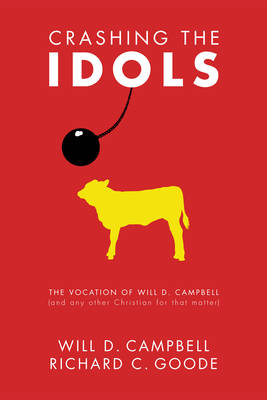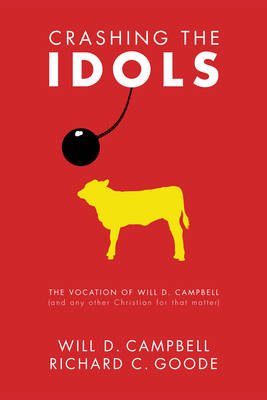
Bedankt voor het vertrouwen het afgelopen jaar! Om jou te bedanken bieden we GRATIS verzending (in België) aan op alles gedurende de hele maand januari.
- Afhalen na 1 uur in een winkel met voorraad
- In januari gratis thuislevering in België
- Ruim aanbod met 7 miljoen producten
Bedankt voor het vertrouwen het afgelopen jaar! Om jou te bedanken bieden we GRATIS verzending (in België) aan op alles gedurende de hele maand januari.
- Afhalen na 1 uur in een winkel met voorraad
- In januari gratis thuislevering in België
- Ruim aanbod met 7 miljoen producten
Zoeken
Crashing the Idols
The Vocation of Will D. Campbell (and Any Other Christian for That Matter)
Will D Campbell, Richard C Goode
Paperback | Engels
€ 43,45
+ 86 punten
Uitvoering
Omschrijving
If prophets are called to unveil and expose the illegitimacy of those principalities masquerading as "the right" and purportedly using their powers for "the good," then Will D. Campbell is one of the foremost prophets in American religious history. Like Clarence Jordan and Dorothy Day, Campbell incarnates the radical iconoclastic vocation of standing in contraposition to society, naming and smashing the racial, economic, and political idols that seduce and delude. Despite an action-packed life, Campbell is no activist seeking to control events and guarantee history's right outcomes. Rather, Campbell has committed his life to the proposition that Christ has already set things right. Irrespective of who one is, or what one has done, each human being is reconciled to God and one another, now and forever. History's most scandalous message is, therefore, "Be reconciled!" because once that imperative is taken seriously, social constructs like race, ethnicity, gender, and nationality are at best irrelevant and at worst idolatrous. Proclaiming that far too many disciples miss the genius of Christianity's good news (the kerygma) of reconciliation, this Ivy League-educated preacher boldly and joyfully affirms society's so-called least one, cultivating community with everyone from civil rights leaders and Ku Klux Klan militants, to the American literati and exiled convicts. Except for maybe the self-righteous, none is excluded from the beloved community. For the first time in nearly fifty years, Campbell's provocative Race and Renewal of the Church is here made available. Gayraud Wilmore called Campbell's foundational work "an unsettling reading experience," but one that articulates an unwavering "confidence in the victory which God can bring out of the weakness of the church."
Specificaties
Betrokkenen
- Auteur(s):
- Uitgeverij:
Inhoud
- Aantal bladzijden:
- 244
- Taal:
- Engels
Eigenschappen
- Productcode (EAN):
- 9781606081273
- Verschijningsdatum:
- 1/04/2010
- Uitvoering:
- Paperback
- Formaat:
- Trade paperback (VS)
- Afmetingen:
- 150 mm x 226 mm
- Gewicht:
- 340 g

Alleen bij Standaard Boekhandel
+ 86 punten op je klantenkaart van Standaard Boekhandel
Beoordelingen
We publiceren alleen reviews die voldoen aan de voorwaarden voor reviews. Bekijk onze voorwaarden voor reviews.









